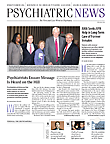According to a report released October 24 by the Government Accountability Office (GAO), 183,712 health care professionals were awarded a total of $2.8 billion in federal incentive payments for participation last year in a Centers for Medicare and Medicaid Services program that rewards eligible hospitals and physicians for demonstrating the “meaningful use” of certified electronic health record (EHR) technology.
These figures represent a nearly threefold increase over the first year of the Medicare EHR Incentive Program, when 58,331 providers were awarded $994.6 million in incentives.
However, when compared with other specialty practice physicians, psychiatrists received the smallest amount of program payments in 2012. Just 7.1 percent of psychiatrists were awarded Medicare EHR incentives last year, compared with 28.7 percent of obstetricians/gynecologists, 41.2 percent of neurologists, and 54.3 percent of gastroenterologists.
“Psychiatry is way behind its peers,” said Steven Daviss, M.D., president of FUSE Health Strategies and chair of APA’s Committee on Electronic Health Records. “Multiple reasons exist, including poor usability, exclusion of mental health centers from program incentives, relative lack of EHR vendors specializing in our field, and concerns about confidentiality and security.”
Despite the poor showing for psychiatrists as incentive-program participants, as a group, the number of specialists receiving incentive payments rose from 8.6 percent in 2011 to 29.3 percent in 2012. And the number of solo practitioners awarded payments also increased year over year from 8 percent to 30.3 percent.
The report also showed that physicians who signed an agreement to receive technical assistance from a Regional Extension Center were 1.9 times more likely to have been awarded Medicare EHR payments than those who did not. Additionally, providers in the top third in terms of Medicare Part B charge amounts or number of encounters were approximately 2.5 times more likely to receive incentives than those in the bottom third for charges or encounters.
Among the GAO’s other findings were that the largest proportion (32 percent) of physicians awarded Medicare EHR incentive payments last year were located in the South, a significant majority (90 percent) of those receiving incentives practiced in urban areas, and professionals awarded their degrees less than 30 years ago were 1.3 times more likely to receive payments than those awarded degrees more than 30 years ago.
To help increase the number of psychiatrists eligible for incentive payments through the Medicare EHR program, Daviss encouraged the expansion of EHR adoption incentives to cover the settings in which most people with mental health and substance use disorders receive treatment.
“APA is also committed to working with EHR vendors to ensure that their products are useful for psychiatrists and other mental health professionals,” Daviss said, noting that “the EHR section of the APA website includes a detailed list of EHR functionalities that are needed for behavioral health EHRs.” ■
